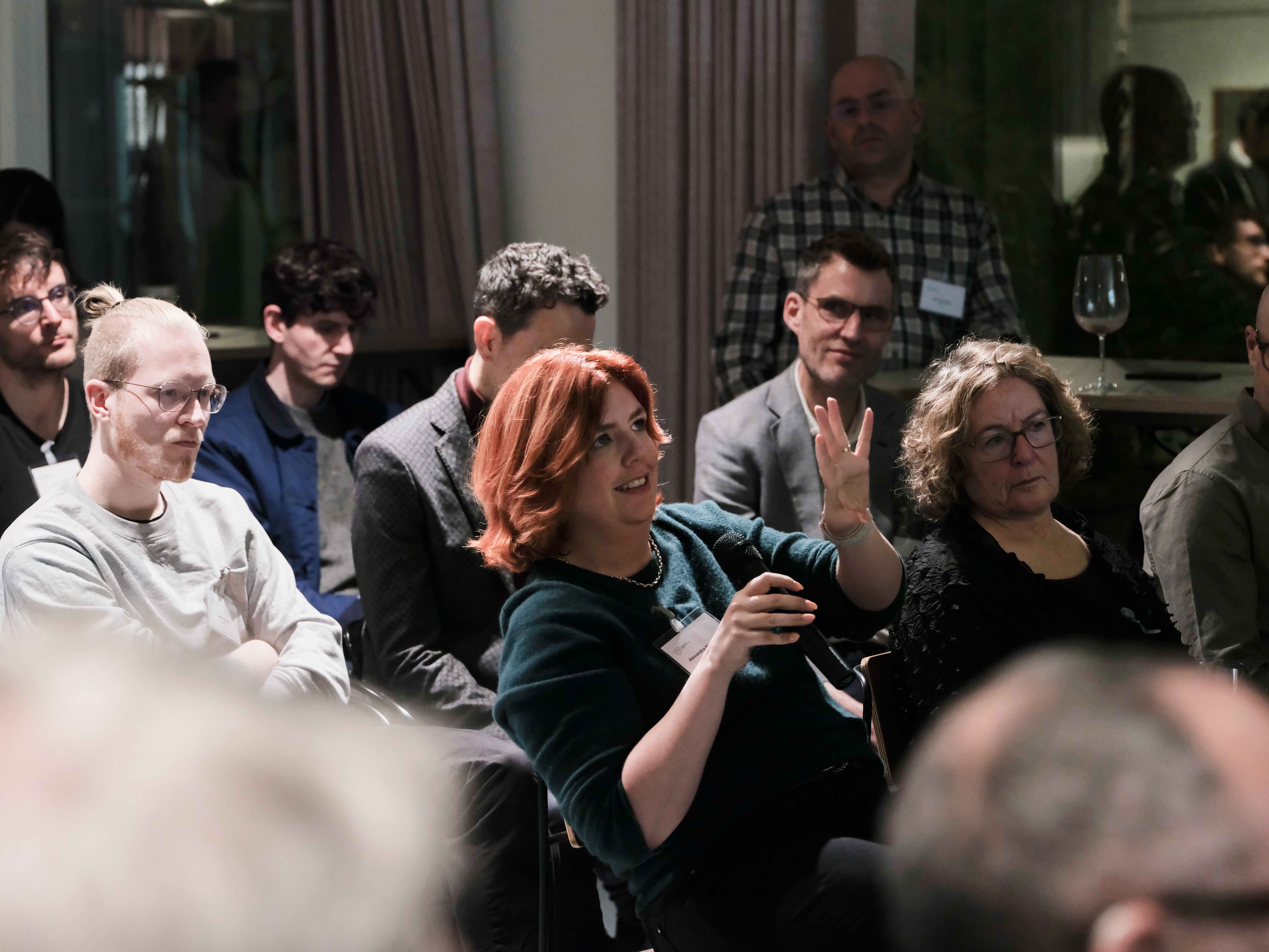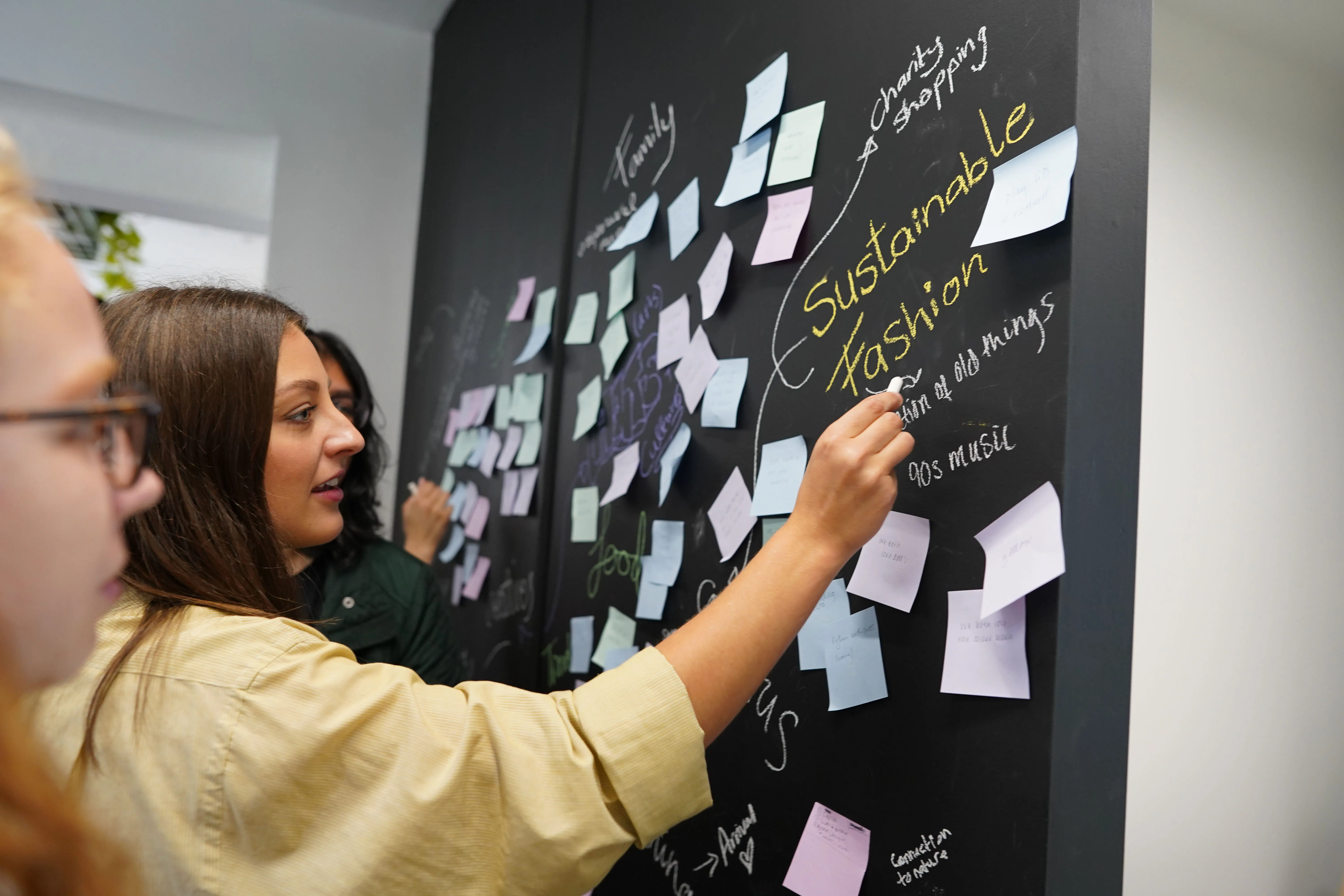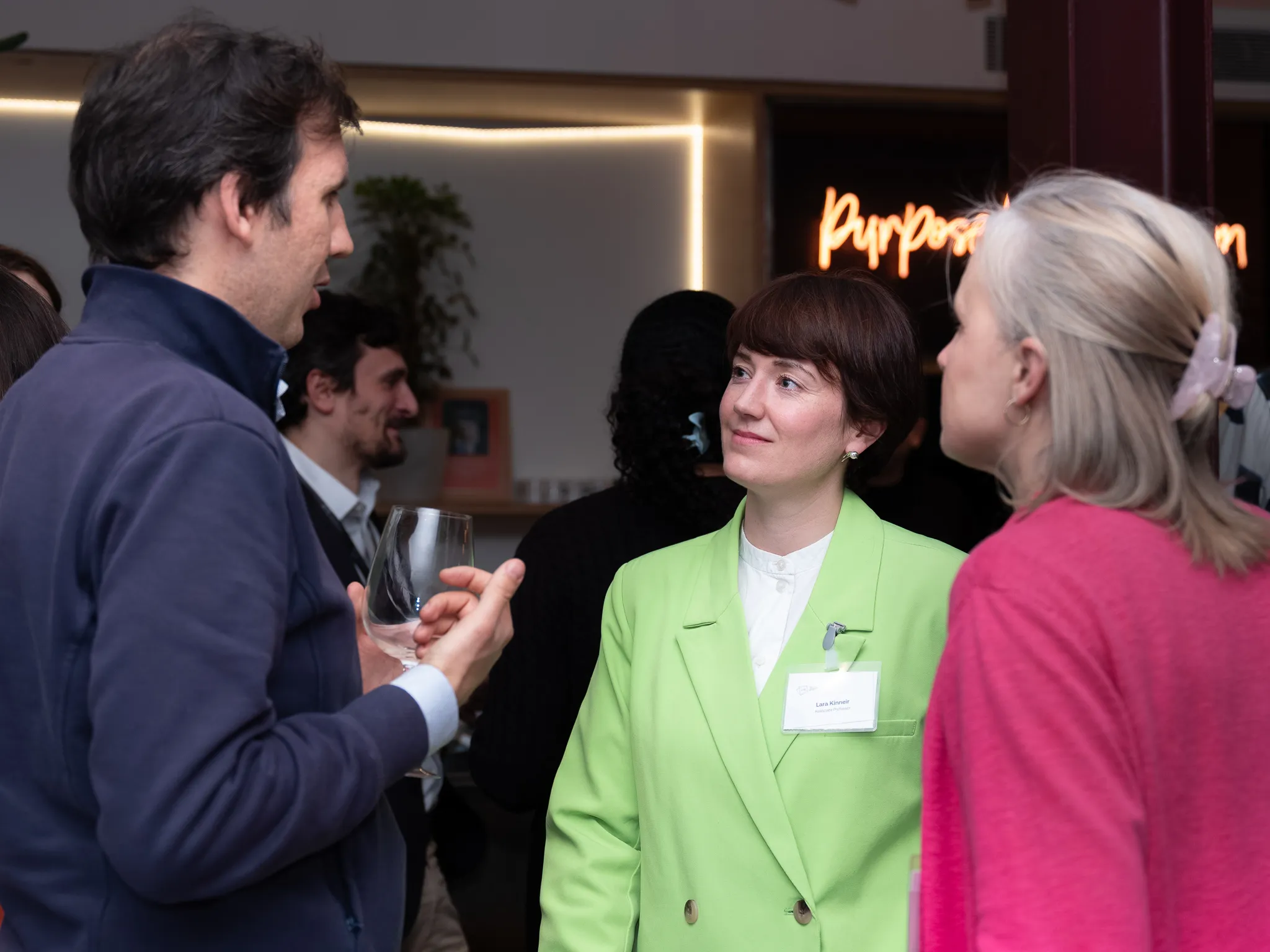We use cookies to improve your experience and for marketing.
See our cookie policy.
See our cookie policy.



At LIS, we’ve flipped the traditional MBA model. Instead of outdated business frameworks and siloed disciplines, our MBA puts the world’s most urgent challenges at the core.
We’ve designed a curriculum around six global shifts reshaping business and society, giving you the tools to lead through uncertainty, not just manage it.
So, how exactly will we do it?

The LIS MBA is structured around 6–8 week learning blocks, each focused on a major shift. The rhythm includes virtual sessions, live cases, and seven intensive in-person immersives in London.
The content of our modules is subject to change as we revise our modules each year depending on student feedback, developments in the field, and the complex problems of the modern world.
.svg)
This week is designed to give you the tools, perspectives, and relationships you’ll need to make the most of the programme ahead. You’ll meet your cohort, explore the six global shifts shaping our curriculum, and get a feel for the collaborative, interdisciplinary learning environment that makes LIS different.
.svg)
Understand how to lead in an interconnected world, where cause and effect are difficult to trace and strategy must be adaptive. Explore simulation, systems mapping, and emergence.
Knowledge and skills:
.svg)
Look beyond the AI hype. Learn the maths, models, and human-machine collaboration shaping the next frontier of intelligence in organisations.
Knowledge and skills:
.svg)
Tackle the energy transition head-on. Discover the political economy of renewables, the infrastructure gap, and how organisations can lead the shift to circularity and conservation.
Knowledge and skills:
.svg)
Move from extractive models to regenerative ones. Explore living systems thinking, biomimicry, ecological governance, and what it means to operate within natural limits.
Knowledge and skills:
.svg)
Rebuild trust in a low-trust world. Study institutional design, transparency, cross-cultural communication, and how to create value that people believe in.
Knowledge and skills:
.svg)
Shift from short-term returns to long-term value. Consider how time, ageing, and intergenerational responsibility change how we work, plan, and lead.
Knowledge and skills:
.svg)
In Problems 2a, you’ll learn to think critically about technological innovation and contested developments. To do so, you’ll learn concepts from Legal and Political Theory, Data Studies, Technology and Culture Studies, and the Philosophy of AI.
This year's problem statement concerns the UK's approach to the regulation of artificial intelligence. Students will learn about “solutionism,” and will be encouraged to think critically about quick fixes to problems and evaluate the UK government's approach to the regulation of AI, using the concepts learnt in this module.
Knowledge and skills:
.svg)
Problems 2b focuses on problems surrounding urban futures. What sort of future should we be enabling for our cities? How, why, and when? This module will move you from developing hypotheses to focusing on the design of interventions.
Through workshops and off-site urban exploratory walks and prototyping projects, you’ll be able to test and measure the impact of collaborative and interdisciplinary interventions to further the opportunities of urban futures.
Knowledge and skills:
.svg)
Superconcepts are powerful ideas that originate in one discipline but go on to have far-reaching and creative applications in other disciplines. For example, evolution (from biology to memes in psychology) or entropy (from physics to migration flows in geography). Students learn the key points of some important superconcepts and apply these in creative ways to a real-world problem.
Mental Models are explanations of thought processes. They give insight into a variety of biases and heuristics that help us understand economics, business, politics and a range of social behaviour. Students have space to learn a range of mental models and to apply these to a problem of personal interest.
Knowledge areas:
.svg)
In Problems 2c, you'll bring together some of the Qual and Quant methods you have learnt in the second year and apply them to a complex real-world problem of your choosing. You'll start by reviewing what is known about the problem in different disciplines, and then bring together at least two different approaches in one ‘mixed methods’ study.
You'll also produce a short video or podcast excerpt to share your findings or outputs with a named professional audience of your choice. The video option allows for a lot of flexibility, from an animation or documentary, to showcasing a design, prototype, or series of artistic works.
Knowledge and skills:
.svg)
Across the year, you will be able to select 3 methods from across the qualitative and quantitative methods options, of which one must be quantitative, and one must be qualitative. These electives will allow you to shape the direction of your learning by allowing you to build on existing skills or explore completely new methods.
What do you do when you write? You think on paper, digitally or otherwise. Writing up thoughts in the form of an argument results in better communication. Writing can be done in many ways, so different styles are often associated with different forms of thinking and doing. Thinking (writing) like a philosopher is not the same as thinking (writing) like a poet, or an architect.
In this module, we ask questions of interdisciplinarity by examining interdisciplinary thinking in the context of writing. We do this by focusing on one interdisciplinary kind of writing: manifesto writing. Some manifestos have the power to mix styles much in the same way as cross-disciplinary knowledge has the power to make us see things in new ways.
Knowledge and skill:
• Writing and communication
• Critical thinking
• Argumentation and storytelling
Starting with a recap of pre-calculus ideas, you will develop an understanding and fluency in the use of single-variable calculus techniques. This is the branch of mathematics that deals with the study of functions and their rates of change, which includes a mixture of analytical, numerical, and computer algebra tools.
You will learn to use differential equations to model real-world problems, e.g. disease spread, climate and energy. This includes learning the numerical techniques for solving differential equations and creating computer simulations. The end of the module is devoted to student-led projects culminating in a computational essay.
Knowledge and Skills:
• Dimensional analysis
• Calculus• Mathematical modelling
• Differential equations
• Computer simulations
In a world where everyone is competing for your attention, how can we tell the story of a complex issue like climate change? This module looks at the forms and structures which storytellers use — from a five-act play to a podcast, and on to a Virtual Reality platform.
Along the way, we consider the business models which support today’s media organisations. At the end of the modules, you’ll put it all together in an authentic multi-media campaign strategy which draws on everything you’ve learnt.
Knowledge and skills:
• Narrative and Storytelling
• Media techniques
• Business models
Network science is an important mathematical tool in today’s world, as many of our day-to-day environments are made of networks. In this module, you will learn to represent networks mathematically as ‘graphs’ and study how to find the shortest paths, cycles, tours and colourings. You will learn about equilibrium and dynamics in networks, and how to apply this to model epidemics.
Then, you will study matchings in graphs, which are related to mechanism design for allocation of indivisible resources. We will move on to game theory and how this is used to analyse strategies and choices in real-world situations in politics, economics and business. You will study strategic form games (e.g. prisoner’s dilemma, the commons problem), dominant strategies and Nash equilibria.
Knowledge and skills:
This module provides you with methods used to collect, understand, interpret and create images. You’ll explore how images create meaning — images do not exist in isolation — by gathering visual information (recollection methods), creating an archive (analytic methods) and via your own creative research.
You’ll develop skills in camera (visual diaries), photogrammetry (the science of making reliable measurements through photographs), archival practices, collage, and creative research. This toolkit enables you to craft your own visual narratives: communication and interpreting the visual aspects of your wider world.
Knowledge and skills:
• Photography
• Curating and archiving
• Creative research methods
How does your phone predict the word you’re going to use next? How might we decode an alien signal if we received one? How can we figure out when documents share topics and when they don’t? This module teaches you how to analyse language at speed and scale using libraries in the Python programming language.
You’ll earn how to obtain large samples of language data and extract non-obvious insights from them. You’re also exposed to the basic principles of machine learning with language. At all points, you’re encouraged to use NLP in an interdisciplinary way to add to your learning in other modules.
Knowledge and skill:
• Natural Language Processing (using Python)
• Linguistics
• Data analytics
Design thinking is a human focused creative process to improve life, through design. It involves ‘thought and action’ to observe, speculate, respond, test, apply, evaluate and refine solutions to problems, to improve life for people and the planet. Its application is universal, ranging from products to services to processes at any scale and in any situation.
Key design thinking mindsets and models and methods have been adopted across professions and across the globe, proving particularly effective in addressing complex issues across and within social, economic, environmental and spatial conditions. Accessible by designers, non designers and end users alike, outcomes are wide ranging, enabling the creation of revolutionary innovation as well as incremental change through prototyping solutions where the financial inputs v. outputs are no less attractive than a traditional single input/output cost.
This module is an introduction to design thinking where we will look at different industries that practice it, why and when different methods are applied, what the impact is and what can be gained from these methods that can be applied across disciplines and problems.
Knowledge and skills:
• Design principles
• Empathy mapping
• Prototyping
• Ideation
This module uses the computer as a powerful tool to implement and explain the ideas we need for sound conclusions from noisy and complex data. You’ll add to your knowledge from your first year to build computational models that allow us to explain relationships with data, and to predict new data.
You’ll focus on “machine learning” approaches to data as they are increasingly dominant across academia, industry, law, and government. You’ll learn to understand these methods in order to understand and criticise their output and to build effective models of your own.
Knowledge and skills:
• Data science
• Modelling
• Machine learning
Material science is the science of stuff. Having a solid understanding of Material Science connects the world around you in a more holistic way. This module is for students who enjoy making and understanding what makes the world around them.
Whilst traditionally Material Science starts with studying the chemistry and physics of atoms, this module takes a ‘design-led’ approach. This means following a brief and its constraints, and from there, selecting and studying the properties of materials. The process involves both experimental making methods and rigour in following the material science data to inform the material selection process.
Key knowledge and skills:
.svg)
This module builds on other modules on the course, depending on the project in question and the knowledge and skills in quantitative and qualitative methods acquired up to the point of starting the capstone project. The primary mode of teaching is through supervision, and therefore this module also provides an experience of an extended supervision process.
Through this module, you will practice how to initiate and carry out an extended interdisciplinary research project and (where appropriate) how to undertake original research. You will consolidate your interdisciplinary research and problem-solving skills through the evidencing of sophisticated and correct research practice, academic conventions (such as sourcing, referencing etc) and communication. You will also consolidate a sophisticated understanding of the ethical issues that may underlie any extended research or other project.
.svg)
In year 3, you’ll choose 5 options from a selection of modules, with at least 1x quantitative and 1x qualitative method included in your curriculum. You’ll also explore mixed methods in more depth. These final modules will help shape your Capstone Project.
The qualitative methods in Year 3 will directly support your research for your capstone project by providing advanced and immersive training in qualitative research strategies and techniques.
You’ll choose at least one and up to four qualitative and visual methods module.
Example modules:
The quantitative methods in Year 3 will directly support your research for your capstone project by providing advanced and immersive training in quantitative research strategies and techniques.
You’ll choose at least one and up to four quantitative methods modules.
Example modules:
.svg)
Bringing together your work in different methods in both Year 1 and 2, this module extends your understanding of what it means to select and implement a range of methods for tackling a challenge. This module prepares you well for many master’s degree programme, as well as research in business, the public sector, and more.

A rhythm of structured, flexible learning that builds depth and connection.
On-campus experiential learning to culminate and kick off each shift.
Real leadership transformation doesn’t just come from learning new content. It comes from changing how you think, lead, and make decisions.The Inner Shift complements the MBA’s outer curriculum by developing the inner capacities that underpin good judgement, adaptability and human connection.
You’ll explore how to:
Want to understand how all the shifts fits together? Download the brochure.
We don’t teach in silos. Our integrated curriculum connects shifts, methods, and business fundamentals with each other, and with the real world.


You’ll be assessed through applied outputs that reflect your professional context, not just traditional essays or exams.
Examples include:
Don't miss out on important updates including course information, new announcements, Discovery Day dates and the latest LIS news.